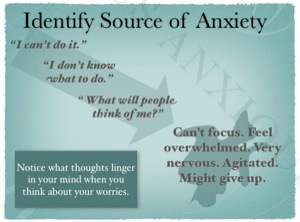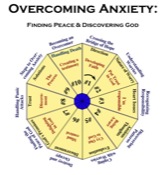
Overcoming Anxiety: Lesson #5
Possessing God's Precious Peace
Discipleship Level 2: Reaching Beyond Mediocrity
Paul J. Bucknell
Problem | Broken | Understand | Description | History | Fighting | Steps | Gate
Video Podcast | D2 Index | RSS
![]()
Fighting Anxiety and Worry
Identify Source of Anxiety
Earlier on, we spoke on the emotional, physical and spiritual symptoms of worry. As believers, we must understand that a person does not simply worry.  Something happens as a precursor to that worry. Just like in the garden, the evil one uses his same techniques on us as Eve.
Something happens as a precursor to that worry. Just like in the garden, the evil one uses his same techniques on us as Eve.
Through careful manipulation of our thoughts and introduction of certain words, the evil one can distort our opinions and get us to make wrong decisions. The devil cannot make us sin, but he certainly can instigate us to evil by doubting God's faithfulness.
We will not focus on the particular sentences and arguments that that evil one induces us to be prone to his temptations.(Do see our article/podcast on the 'The Deadly Cycle'!) The actual way one is tempted is hard to detect, but we can detect something much more easily.
Worry and anxiety are characterized by repeated thoughts. These thoughts generate certain feelings and responses.These worries usually have to do with ways to take care of our needs now that our familiar way of dealing with them does not work.The evil one, however, must keep us doubting God. 
This doubt is generated by a repetition of these thoughts. Since they are repeated, they become quite familiar to us. It is interesting that though we are so accustomed to them like old friends, we do not even notice their presence or their impact on our decisions. That is just the way the evil one wants it!
We want to bring these words to light. We expose them by first noticing them. They can be any short statement. They are not arguments but potent phrases. I will suggest a few, but do make your own list on the worksheet that accompanies this lesson.
- I can't do it.
- I don't know what to do.
- What will people think of me?
- What shall I say?
Each statement breeds worry and despair. The first statement, "I can't do it" is not necessarily a bad statement. In many cases, however, it reads like this, "I can't do it. What am I going to do?" A biblical response would be opposite to that. "I can't do it on my own. I need God's grace. I welcome you Lord to come into my life at this point and do what is impossible for your glory." The first extended statement breeds worry while the later brings faith. All of these and many others are just like.
These temptations always purposely instigate mistrust. This is just what the devil did in the garden. Since our worries are built upon these statements and associated conclusions that gain acceptance in our mind, our freedom from worry is dependent upon our identification of these thoughts. In fact, our freedom from worry is largely gained by exposing these lies resulting in rebellion against the Lord.
Some people use distraction and discipline to keep from anxiety. They are keeping those thoughts of insecurity from their minds. By eastern meditation, exercise or busy involvement in some activity one's mind is occupied with other things and therefore finds some relief. This does not cure the worry, however. Once a person enters back to his regular routine, the worry is reactivated.
Wouldn't it be better to altogether get rid of the anxiety? The power of the gospel in this one area alone is an excellent reason for someone to come to know the Lord. A Christian by Biblical definition is one that puts his or her trust in the Lord, not just for their sins through Jesus but for all things.
Training in the truth
Trust comes from believing that God will timely care for your needs no matter how impossible your circumstances might appear.
Drill it into your mind. This is the truth for every genuine believer in Christ. We are concerned with the source of this truth. If you are a believer, you probably will not doubt that statement. Knowing a truth in your mind, however, does not mean that one really believes it.
| A Muslim also believes in a Creator God but cannot share an equal trust in God's care for their lives. They believe God rules over their lives but does not share a faith or trust in God’s good will toward them. It is dependent upon their behavior which is, as in all our cases, far from satisfactory. The Muslim needs to come to know God as Father through belief and devotion to Christ. The Buddhist tries to eliminate worry through not wanting things. This is a sterile attempt by the world not to be possessed by envy and greed that has captivated most of the Western world. The Buddhist likewise needs to know that a faithful Creator is calling people to trust in Him so that He can manifest His goodness to them. |
The believer is acquainted with all sorts of truths, but the evil one has a way of keeping those truths from what we really rely on in a given circumstance. This is why we need training. Jesus in the Parable of the Sower clearly indicated that the evil one snatches the word of God from the Christian. We had better be alert!
In order to get things straight, we can simply see if we are worried about some matter. The presence of worry or anxiety always is an indication that one is doubting that God will timely care for your needs. This will include our worries for others. This other person's need has become our need. If we do not worry, then we do not have a lack of faith (though we still might trust things other than God like our cleverness or income).
Some might ask, "God can't expect us to be accountable for our worry before we recognize it, can He?" Indeed He does. When we ask such a question, we do not understand the horror of our sins. In the case of anxiety, we are basically stating these things.
"God, you say you care for me and will help me, but I don't believe you. You won't take care of me. I need to figure a way to take care of myself. My way is better than yours."
The secularist, he is even more bold.
"Who needs God. I can take care of myself. I have worked my way through life and deserve a good life. Even if I run into hardship, I will never turn to God. I can even work through those times."
Can you see how doubt is seeded in thoughts of rebellion? We resolve to work it out our way apart from God (and usually for purposes apart from Him). God calls us to repent. We cannot find His peace until we acknowledge the idols that we have trusted (the idol might be us) and confess how we have not trusted Him for His provision. We doubted His ways as best or sufficient and took it upon our own ways to live out our lives.
"O LORD, do not Thine eyes look for truth? Thou hast smitten them, But they did not weaken; Thou hast consumed them, But they refused to take correction. They have made their faces harder than rock; They have refused to repent" (Jeremiah 5:3).
Repentance leads to honest and genuine confessions. Confession is part of repentance. Instead of hardening our hearts to defending our ways, we acknowledge how we have departed from Him. If you see the signs of worry in your life, then confess your unwillingness to trust Him for those things. Tell Him how you have taken the task into your own hands. Eve thought she would gain something better by eating from the forbidden tree. We use other means to get what we think is best for ourselves. God did not make us to life our lives this way.
You might think you believe or teach others to trust, but still not trust Him. I remember once going back and forth quite worried about some funds I needed for a mission trip. It was not just my travel to India that I needed money for but about $7000 for pastor conferences that I was sponsoring. I finally realized I was worrying. I could not focus on my work as usual. The thought that the Lord could not provide all that money in 1-2 weeks just kept nagging at me and taking away my peace. I began to cry out to the Lord for help.
God spoke powerfully to me through His Word just at the point of my confession and my crying out to Him for help. From that point on, God built a wonderful sense of peace in my heart. Even though I still did not have the money for the trip in less than two weeks away, my heart was fully at peace. I was no longer paralyzed by the worry. I can clearly pray and take the steps I could with the money I had at hand. I praise God for fully providing!
Truths about God & His Ways
At some point we will need to master some truths from God's Word that counter the doubt in our minds and support the truth. The doubt suggests the Lord either will not or cannot care for my needs while the truth is that God promises to care for our needs in Christ Jesus. Just think through what each of these verses are really saying.
"Humble yourselves, therefore, under the mighty hand of God, that He may exalt you at the proper time, casting all your anxiety upon Him, because He cares for you (1 Peter 5:6-7).
Notice how it is quite right to humble yourself before God. You are in a humble circumstance. You cannot care for yourself or needs. You can't visit a sick relative. You can't… The list is endless. We need to realize that although we are in a humble circumstance, this does not mean that God cannot take care of us. Think how many times in the Old Testament the Israelites were facing great odds against them as an enemy purposed to destroy them.
I have learned to say that it is okay to be in humble circumstances. God is still there. The Lord still cares for us. So because of His care for us (this is the trust), we will trust Him to take care of us in the way that He wants when it best suits His judgment and wisdom. In the meantime we will put all our concerns in His lap.
"Therefore do not be anxious for tomorrow; for tomorrow will care for itself. Each day has enough trouble of its own (Matthew 6:34).
This is a clear exhortation from Jesus that we should not worry. Worry is sin. It is not helpful, but notice Jesus' philosophy. Jesus focuses on each day's need.
He assumes that God the Father gives enough grace in a day's time ("tomorrow will care for itself"). I can safely assume that God will give me all the grace I need for today. God can meet future needs the way He wishes. For today, however, I can trust Him for that which I face. So after prayer and a prayer pledging my dependence on Him for that day, I can meet up with all sorts of lions and wild beasts (usually in people form) and still be gracious and kind because of His grace!
"Be anxious for nothing, but in everything by prayer and supplication with thanksgiving let your requests be made known to God" (Philippians 4:6).
Paul the apostle also exhorts all the believers not to be anxious in Philippians 4:6. There is another way, a much superior way, to handle stressful situations. The thought behind these words 'be anxious for nothing' is powerful. In other words, you should fully understand that God is so faithful that He will take care of your needs. God will provide.
We must pray, but in our prayer we should respond to God's faithfulness by thanking Him. We can trust God for these needs. There are so many times that I sensed I could not handle things. Just recently, for example, I needed to speak in Chinese for over an hour without any preparation time to brush up on my Chinese, I again faced those anxious thoughts. How would I respond? Fortunately, I got up early that morning, sought the Lord in prayer and His Word. He had a special message for me from Jeremiah 1 (I just started reading through Jeremiah that day).
"Then I said, "Alas, Lord GOD! Behold, I do not know how to speak, Because I am a youth." But the LORD said to me, "Do not say, 'I am a youth,' Because everywhere I send you, you shall go, And all that I command you, you shall speak" (Jeremiah 1:6-7).
The truth from this verse which strengthened my faith was the fact that the Lord gets involved in such areas of life. He fully understands problems of public speaking and intimidation and was willing to help Jeremiah. I then knew He would help me too. The Lord again used his Word to establish my faith.
We will regularly meet up with circumstances that will be a place of testing. Like Saul of long ago, we will face those perplexing situations that just do not seem right. "And as for your donkeys which were lost three days ago, do not set your mind on them, for they have been found. And for whom is all that is desirable in Israel? Is it not for you and for all your father's household?" (1 Samuel 9:20). The Lord sent the prophet to tell Saul not to worry. Sometimes our situations that we face have greater purposes than our own lives. We do not know. We do not need to know. We will know what we need to know.
Let's now look at the process anxiety and worry are overcome. Next page.






